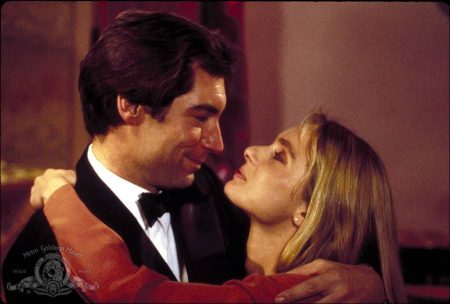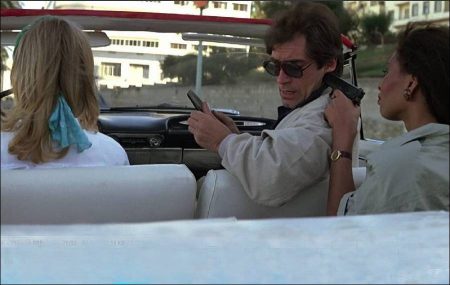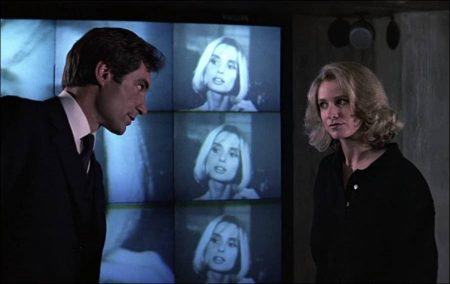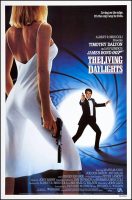Taglines: Living on the edge. It’s the only way he lives.
The Living Daylights movie storyline. James Bond – agent 007 and sometimes referred to as simply ‘007’ – and two other MI6 agents conduct a training exercise at a military base in Gibraltar with the SAS. There an assassin disguised as an MI6 agent gives a message to one of the agents (004), attaching a small note to a carabiner clip and sends it down the agents rope and then kills him by cutting his rappelling line, causing the agent to fall to his death. Bond witnesses the assassin trying to escape in a vehicle and pursues him, which results in the assassin’s death.
Bond is sent to Bratislava to help Agent Saunders from Station V conduct the defection of a KGB officer, General Georgi Koskov, covering his intermission escape from a concert hall in Bratislava. During the mission, Bond notices that the KGB sniper assigned to prevent Koskov’s escape is a female cellist from the orchestra. Noting the unsteady manner in which she is holding the rifle, Bond concludes that she is not a professional assassin.
He shoots at her rifle, blowing out the breech, preventing her from shooting Koskov. Koskov is taken by car to an operating center of the Russian gas pipeline and is shot into Austria in a cleaning plug. Saunders is furious about Bond’s decision to spare the cellist, but Bond defiantly says that he will risk M’s displeasure.
In his post-defection debriefing at a safehouse outside London, Koskov informs MI6 that the KGB’s old policy of “Smiert Spionam”, meaning “Death to Spies”, has been revived by General Leonid Pushkin, the new head of the KGB. A blond assassin, Necros, infiltrates the safehouse disguised as a milkman, and abducts Koskov after a pitched battle where several MI6 agents are killed and injured.
Bond is directed to track down Pushkin in Tangier and assassinate him in order to forestall further killings of agents and escalation of tensions between the Soviet Union and the West. Although Bond’s prior knowledge of Pushkin initially leads him to doubt Koskov’s claims, he agrees to carry out the mission when M shows him the tag found on 004’s body bearing the message “Smiert Spionam”.
The Living Daylights is a 1987 spy film and the fifteenth entry in the James Bond series produced by Eon Productions, and the first of two to star Timothy Dalton as the fictional MI6 agent James Bond. Directed by John Glen, the film’s title is taken from Ian Fleming’s short story “The Living Daylights”, the plot of which also forms the basis of the first act of the film. It was the last film to use the title of an Ian Fleming story until the 2006 installment Casino Royale.
The Prince and Princess of Wales attended the film’s premiere on 29 June 1987 at the Odeon Leicester Square in London. The Living Daylights grossed the equivalent of $191.2 million worldwide. In the United States and Canada it earned $51,185,000, including an opening weekend of $11,051,284, surpassing the $5 million grossed by The Lost Boys that was released on the same day,[55] and setting a record 3-day opening for a Bond film, beating Octopussy’s (1983) $8.9 million but not the 4-day record of $13.3 million set by A View To A Kill (1985).
About the Production
Originally the film was proposed to be a prequel in the series, an idea that eventually resurfaced with the reboot of the series in 2006. SMERSH, the fictionalised Soviet counterintelligence agency that featured in Fleming’s Casino Royale and several other early James Bond novels, was an acronym for ‘Smiert Shpionam’ – ‘Death to spies’.
The film was shot at Pinewood Studios at its 007 Stage in the United Kingdom, as well as Weissensee in Austria. The pre-title sequence was filmed on the Rock of Gibraltar and although the sequence shows a hijacked Land Rover careering down various sections of road for several minutes before bursting through a wall towards the sea, the location mostly used the same short stretch of road at the very top of the Rock, shot from numerous different angles. The beach defences seen at the foot of the Rock in the initial shot were also added solely for the film, to an otherwise non-military area. The action involving the Land Rover switched from Gibraltar to Beachy Head in the UK for the shot showing the vehicle actually getting airborne.
Trial runs of the stunt with the Land Rover, during which Bond escapes by parachute from the tumbling vehicle, were filmed in the Mojave Desert, although the final cut of the film uses a shot achieved using a dummy. Bratislavan sequences were filmed in Vienna. The outside shots of the Bratislavan concert hall show the Volksoper, while the interior were shot in Sofiensäle. The tram scene was filmed in Währing, Vienna and the border chase was filmed in Carinthia, also in Austria. Other locations included Germany, the United States, and Italy, while the desert scenes were shot in Ouarzazate, Morocco. The conclusion of the film was shot at the Schönbrunn Palace, Vienna and Elveden Hall, Suffolk.
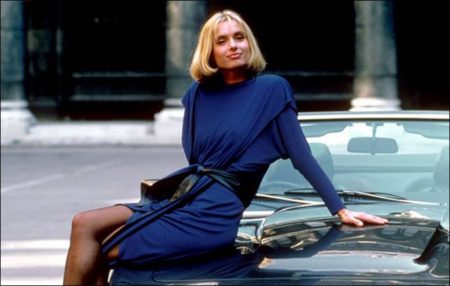
Principal photography commenced at Gibraltar on 17 September 1986. Aerial stuntmen B. J. Worth and Jake Lombard performed the pre-credits parachute jump. Both the terrain and wind were unfavourable. Consideration was given to the stunt being done using cranes but aerial stunts arranger B. J. Worth stuck to skydiving and completed the scenes in a day. The aircraft used for the jump was a C-130 Hercules, which in the film had M’s office installed in the aircraft cabin. The initial point of view for the scene shows M in what appears to be his usual London office, but the camera then zooms out to reveal that it is, in fact, inside an aircraft.
Although marked as a Royal Air Force aircraft, the one in shot belonged to the Spanish Air Force and was used again later in the film for the Afghanistan sequences, this time in Soviet markings. During this later chapter, a fight breaks out on the open ramp of the aircraft in flight between Bond and Necros, before Necros falls to his death. Although the plot and preceding shots suggest the aircraft is a C-130, the shot of Necros falling away from the aircraft show a twin engine cargo plane, a C-123 Provider. Worth and Lombard also doubled for Bond and Necros in the scenes where they are hanging on a bag in a plane’s open cargo door.
The press would not meet Dalton and d’Abo until 5 October 1986, when the main unit travelled to Vienna. Almost two weeks after the second unit filming on Gibraltar, the first unit started shooting with Andreas Wisniewski and stunt man Bill Weston. During the course of the three days it took to film this fight, Weston fractured a finger and Wisniewski knocked him out once. The next day found the crew on location at Stonor House, Oxfordshire, doubling for Bladen’s Safe House, the first scene Jeroen Krabbé filmed.
The Living Daylights (1987)
Directed by: John Glen
Starring: Timothy Dalton, Maryam d’Abo, Jeroen Krabbé, Joe Don Baker, John Rhys-Davies, Art Malik, Andreas Wisniewski, Thomas Wheatley, Robert Brown, Desmond Llewelyn, Caroline Bliss
Screenplay by: Richard Maibaum, Michael G. Wilson
Production Design by: Peter Lamont
Cinematography by: Alec Mills
Film Editing by: John Grover, Peter Davies
Costume Design by: Emma Porteous
Set Decoration by: Michael Ford, Tal Schneider, Anne Seibel
Art Direction by: Terry Ackland-Snow
Music by: John Barry
MPAA Rating: None.
Distributed by: MGM / UA Communications Co. (United States), United International Pictures (International)
Release Date: July 31, 1987
Views: 736
